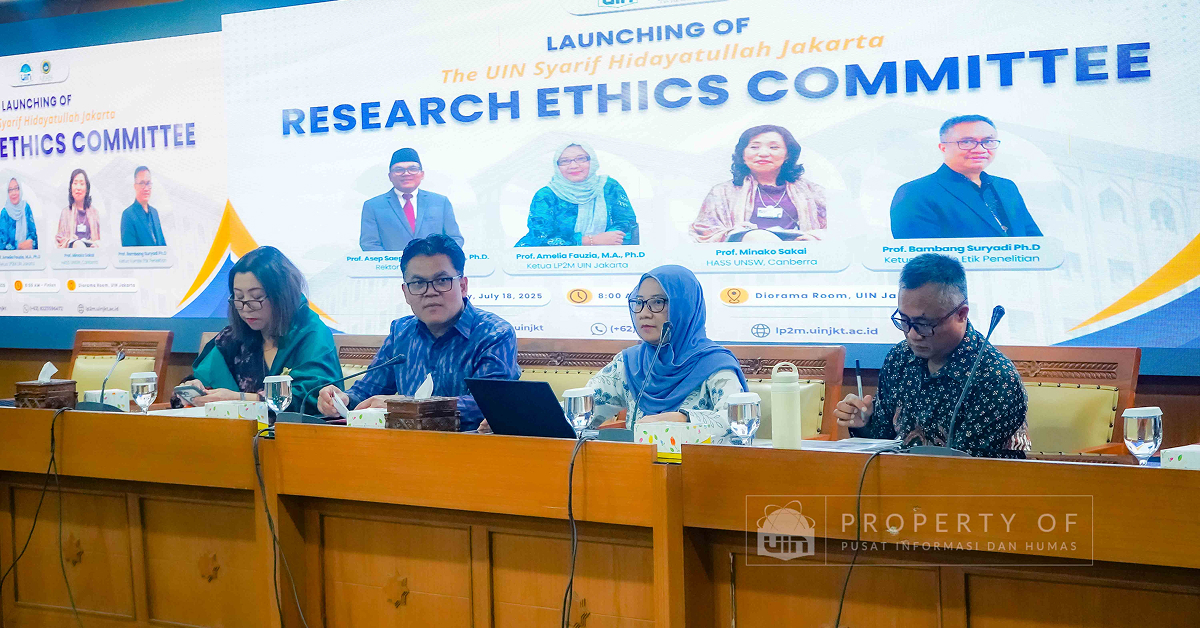UIN Jakarta Leads with First Ethical Review Committee in PTKIN
Diorama Room, LP2M News — UIN Jakarta officially launched its Research Ethics Committee (REC) on Friday, July 18, 2025. The launching ceremony, held at the university’s Diorama Room, was attended by prominent figures including UIN Jakarta Rector Prof. Asep Saepudin Jahar, Ph.D., Head of the Institute for Research and Community Service (LP2M) Prof. Amelia Fauziah, M.A., Ph.D., Chair of the REC Prof. Bambang Suryadi, Ph.D., and keynote speaker Assoc. Prof. Minako Sakai from UNSW Canberra.
The event, titled “Launching of the UIN Jakarta Research Ethics Committee”, marks a historic milestone, as the REC is the first university-level ethics committee established within Indonesia’s State Islamic Higher Education (PTKIN) system.
In her opening remarks, Prof. Amelia Fauziah explained the motivation behind the committee’s formation. She highlighted the increasing challenges faced by faculty members and students in publishing academic work due to the lack of ethical clearance—particularly in the humanities, education, and science and technology—fields that previously lacked dedicated ethical oversight.
Rector Prof. Asep Saepudin Jahar, who officially inaugurated the committee, expressed his full support for its establishment. “I have long envisioned the presence of such a committee. This REC reminds us of the critical need for ethical and collaborative research practices—both nationally and internationally,” he stated. He also encouraged faculty to fully utilize the committee’s services to elevate the quality of research at UIN Jakarta.
In his address, Prof. Bambang Suryadi, Chair of the REC, emphasized that ethical considerations are fundamental to any scholarly inquiry. “Research is not just about answering questions—it must be grounded in scientific integrity and ethical conduct. That’s precisely the role of the REC,” he explained. He noted that the committee was established under Rector’s Decree No. 18 of 2025 and is aligned with Indonesia’s Law No. 11 of 2019 on the National Science and Technology System.
The REC will oversee six disciplinary clusters: medicine, health sciences, psychology, Islamic studies, social sciences and humanities, education, and science and technology. Its responsibilities include reviewing the ethical feasibility of research proposals, granting ethical approval, protecting research participants’ rights and welfare, and providing documentation and guidance on research ethics. All research involving human subjects, personal data, experimental animals, or sensitive topics must obtain ethical approval before proceeding. To ensure consistency in risk assessment, all reviewers will undergo standardized training.
The launching ceremony also featured a public lecture titled “Research Ethics for Humanities, Social Science, and Natural Science”, delivered by Assoc. Prof. Minako Sakai. She underscored the importance of research integrity, participant protection, and the need for a secure, digital-based ethical review system. She further recommended the dissemination of ethical guidelines across all faculties and the appointment of permanent departmental representatives within the committee.
The establishment of UIN Jakarta’s Research Ethics Committee is expected to serve as a catalyst for promoting a culture of responsible, ethical, and internationally-aligned research, while reinforcing the university’s reputation as a leading academic institution both in Indonesia and globally.
(Documentation: PIH LP2M UIN Jakarta)

